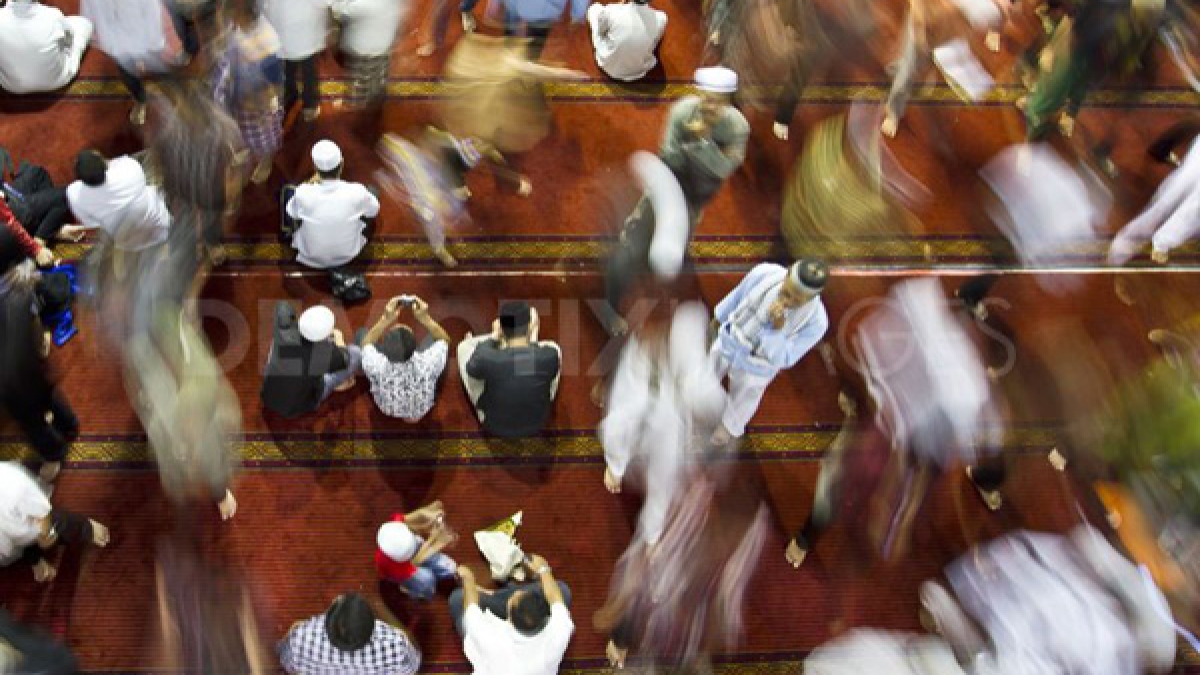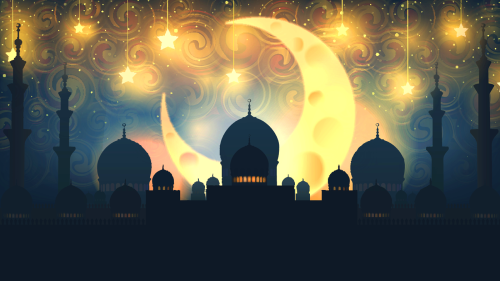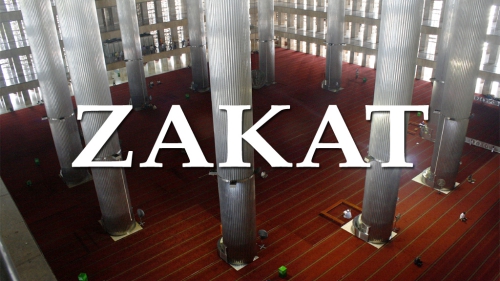Welcoming the Month of Ramadan

 |
|
"O you who have believed, decreed upon you is fasting |
The month of Ramadan is upon us; the Prophet mentioned in this good hadith (narration of the sayings or actions of the Prophet
) that when the month of Ramadan comes, the gates of Paradise are opened and the doors of the Hell-fire are closed and that the devils are chained (Ahmad and an-Nasa'i).
The Objective
We should come to this month, number one, with some objective that we've written down in the form of a few goals that we want to take from this month. Maybe we can put them in our iPhone or our Palm; we can put them on our computer-but we should have a few goals because upon us is a noble time. The Prophet said, "There are two blessings that most people miss out on: their free time and their health." (Bukhari)
There are two blessings that most people lose out on - one of them is free time, which can be utilized to do noble acts of worship. Al Ala' Ibnu Qayim (radi Allahu `anhu - may Allah be pleased with him) mentioned that Allah (subhanahu wa ta`ala - exalted is He) out of His mercy, out of His greatness, and out of His awesome power and mercy to His servants, Allah has chosen specific times when people, if they increase their `ibadah-their worship, their servitude, their focus on Allah
- their rewards are greater. And one of them is this month of Ramadan, particularly the last ten nights.
For that reason, we can take from this month a few lessons. Imam ad-Dahlawi in his book Hujjat ul-Lahi'l-Baligha mentioned something very important: one is foolish who thinks that Allah legislated these acts of worship without any wisdom. Takleef (difficulty) alone - without any wisdom, without any objectives, without any goals that can be seen by the servant of Allah - is foolish. For example, in Surat al-Kahf, Allah
discusses sending down the rain and how it gives life to a dead land; He says these are signs for every servant who repents and returns to Allah. These are a few lessons we can take from siyaam (fasting) and insha'Allah (if Allah wills) we can benefit.
Lesson #1
Number one is the lesson of ease and tadarruj (a step-by-step process in developing ourselves) and Islam. We have to avoid coming from a mindset that is post-colonial, post Jim-Crow (for those of us who lived in America), post-set-of-utopian-constructs where the concept of religiosity and religion itself was changed and uprooted in the Muslim world, which causes us to be ideologues. Islam has become an ideology, it is no longer organic - it does not have any natural disposition to itself.
Everything is done in private and not in the public scene anymore. Everything is policy without practice. One of the dangers of this is the inability to teach Islam and practice Islam correctly as the Prophet taught his companions, as we find in his life this concept of tadaruuj.
As Allah described the companions of the Prophet
, they develop like seeds overtime, the law of the land overtime, until they became pleasing to Allah
. Not in one day, not in five minutes.
I'll give you an example of this. A few weeks ago, there was a non-Muslim in front of this building and he saw the new sign, alhamdulillah (praise be to Allah) we got a sign. When I became Muslim, brothers and sisters, there was no sign in the masjid, I just kept driving around. I didn't know where the mosque was because there was no sign. We were still mudathirun-we had not removed the blanket yet from us as Allah ordered the Prophet .
So one of our community members, I don't know who he is, but someone complained to me. When he saw this non-Muslim walk by the sign and start to look at it, one of our community members, he started to yell from across the street as loud as he could, "Hey! You wanna know about Islam?"-as loud as he could.
So consequently, alhamdulillah luckily the guy did not run away like Usain Bolt, but this non-Muslim became kind of scared. He said, "Why is this person yelling at me like this?" Because in this country, brothers, we don't yell at people; even in the Muslim countries, we shouldn't yell at people like this.
So this is an example of not practicing the methodology of the Prophet . Once a person came in to our community wanting to learn about Islam and I heard the brothers, the first thing they told him was "You have to change your name." Number two, they said, "You have to be circumcised." I swear by Allah. This is not funny, this is a very serious issue because we are talking about the message of the Prophet
. And number three, "You can't eat in the dumps." They told him these three things-you think he came back to the masjid after that?
So what happens when he goes home to his friends and they ask him what's the message of Islam? What do you think he will tell them? He will probably say, "Man, Muslims are insane people. They told me to change my name, do this and not eat out at McDonalds anymore." Is this understanding of the religion that was given to us by the Prophet ?
Allah says, "Fasting was prescribed for you," (Qur'an, 2:183). So the first question that comes to mind, since siyam is a word that has many meanings, is "What is siyam?"
Then Allah says ayyamam-ma'dudat, this is called jam` al-qila in the Arabic language, ayyamam-ma'dudat means a few days.
When I became a Muslim, I remember when they told me that we're going to fast, the first question, subahan'Allah (glory be to Allah) that came to my mind was "How long? How long do you fast? And how do you fast?"
Here, Allah shows this is tadarruj, so he says "a few days only." Why? To build them, to let them feel excited about siyam. Then the next verse we find the bayan of this. Allah says, "the month of Ramadan when the Qur'an was revealed" (Qur'an, 2:185). Then Allah makes it clear to them the month of Ramadan.
So we see this process of what is called tadarruj in da'wah, how we should build people, how we should develop people, and how we should take people stage by stage, stage by stage, according to shari`ah, according to the legislation of the system which Allah sent to us.
Lesson #2:
Number two is that the month of Ramadan is a blessed month; as Shaykh Al Allama Shaqinti mentioned, this is a month where we can feel, we can taste the `ibadah of the angels. This is because the angels "do not disobey Allah." (Qur'an, 66:6) They obey Allah all the time.
When we make the intention to fast, the act of siyam is for the entire month. Usually when we do ritual acts of worship we have to stop our work to pray, we have to stop our work to do certain types of `ibadah but with the siyam wherever we go we're fasting-whether it is in school, whether it is at home, whether it is at work, any place we are, alhamdulillah we observe this fast for the sake of Allah and can taste the `ibadah of the angels. We ask Allah
to make this siyam beloved to us; we ask Allah
to give us the correct understanding of this deen (way of life); and and we ask Him to guide us in worshiping Him in the best of manners. Ameen.
The Prophet said in a number of authentic narrations, "Whoever fasts this month of Ramadan with faith in Allah and hope in Allah's forgiveness, his previous sins will be forgiven." (Sahih Bukhari)
The Prophet also said in the hadith (narration of the Prophet's
words or actions): "Whoever stands and prays in these nights of Ramadan with faith and hope in Allah, Allah
will forgive them." (Sahih Bukhari)
We take one important lesson quickly from this month, the lesson that we are not asked to be utopian. This is the danger as I alluded to earlier-coming out of a colonial-religious understanding where a massive inferiority complex was ingrained in us, which we still have, we cannot deal with the drama in our community.
Instead of dealing with the problems of our communities, we push them under the rug. For example, I have had parents that come to me with their kids and they say, "Brother Suhaib, please don't put this in the newsletter on Friday." What do you think I'd put it in the newsletter?
We're hyper-paranoid of people finding out that we make mistakes because we think that those mistakes mean that Islam is mistaken, and this is a massive error. We are not secure enough to deal with our own drama. We are not secure enough to battle with our own demons because we're scared, because of an inferiority complex, and because our understanding of religion has been changed to utopianism.
But Allah says, "Wa la yadurallaha shay'a" - nothing can hurt Allah . And the hadith of the Prophet
: "If the first of you and the last of you and the most righteous of you stood and asked Allah
and he gave, you would not take anything from Him
and if the worst of you also would not harm Allah
in any way." (Sahih Bukhari)
Because of that, the month of Ramadan is openly calling us to repent to Allah , to re-establish our relationship with Allah (swt), to seek His mercy-for what? Because we have not made any mistakes or because we have made mistakes? Because we have made mistakes. But when we bring this utopian understanding into the community, we push the Muslims away.
As one person said to me, "When I come to the mosque, it is like I'm coming to the court of Judge Judy to be judged by the people and to be declared as evil." But in the time of the Prophet , the word imaan came from the meaning security and trust; that there is a trust with Allah, amantu bilLah. Therefore, Allah
used this word, not `aqidah (Islamic creed), not tauhid (doctrine of Oneness of God), but imaan. Imaan in Allah
that this security with Allah is as the Prophet
mentioned in his definition to believe in Allah, His Angels, and His Books to the end.
To have secured means I can come to you with my mistakes and I trust that you will forgive me if I seek your forgiveness. That is why Allah says in the Qur'an, "If you come back to Him" - satajiduhu tawaban rahimmah, you will find Allah the Forgiving, the Merciful.
In our communities now, we are starting at a micro level. Our people are coming to this community and seeking Allah's mercy. Our people who have made mistakes are coming back, the divorcees fill our community, the drunkards fill our community. Of course there should be some hayaa' (modesty), but again, if we're not careful, we'll adopt a self-righteous set of constructs that will push the masses of the community away from us, especially the young people.
I notice this because every time someone comes and asks me a question, you know what the first thing they say to me is? "I'm sorry." Why are you sorry? "I'm sorry I need to ask..." Why would you be sorry? Have some self-confidence, brother. "I'm sorry brother . . ." What are you sorry for, man? I got the same drama that you got akhi (brother). "I'm sorry..." No, you're not sorry, you are human!
One thing we take from the month of Ramadan is that Ramadan is a means of forgiveness. For what? For mistakes. So the Muslim community is going to make mistakes, as Allah says, fastaqimu ilayhi wa astaghfirru -
 |
|
"...be upright and seek Allah's forgiveness." (Qur'an, 41:6) |
This use of the letter "waw" means that at the same time that you're upright, seek Allah's forgiveness.
Because of the insecurity in our Muslim community, we find Muslims in clubs. People say, "I can't believe a Muslim would do something like that." Why not? I'm not saying go to the club but why not? They are human beings! "I can't believe she lied about me. She wears hijab, that's why I don't wear hijab." Why not? She's a human being!
But that doesn't hurt Islam at all-Islam is Islam and Muslims are Muslims. That's why the first thing I tell a convert is "Don't judge Islam by Muslims, judge Islam by itself." And that's why we have the famous statement by Shaykh Muhammad Abdou. When he went to Europe he said, "I saw Muslims without Islam," then he said about us, "I saw Islam without Muslims." There is nothing wrong with acknowledging mistakes; the community has to gain this maturity in order to deal with the problems of the community.
If we live under a self-righteous set of constructs, we're not going to help each other at all. But look at the Prophet's community: even a drunk can come to the Masjid of the Prophet
. In Sahih Bukhari, a drunken man comes to the Masjid of the Prophet
and the Prophet
orders him to be punished. After the takzir (sentence to a crime) is made upon him, the people start to chastise that man, but the Prophet
said, "Don't help shaytan (the devil) on your brother."
He trusted the Prophet . Would a drunk come to me? No way. Would he come to one of the shuyukh (scholars, leaders) of the Masjid? No way. They would not come because they are fearful of this retribution, fearful of their mother and father displayed in front of the community.
One sister said to me, if the people knew about my mistakes in this community, they would laugh at me and relish my mistakes. This is nifaq (hypocrisy). Intusiibukum hasanatun tusu'hum wa intusiibukum saiyatun yafra'a hu nabihah. Allah mentions, "If something bad happens to you, O Muhammad , the munafiqin (hypocrites) are happy with it."
So we have to move beyond that self-righteous way of looking at things and get back to that good ol' fashion religion that Grandma use to talk about. Organic religion that understands people who make mistakes; where the community can be the crutches that carry the people through errors and mistakes that they make, not judges and self-righteous kings who think that they know everything. This is a disaster.
The month of Ramadan comes as a means of forgiveness for our sins that Allah knows we're going to make because He knows us better than we know ourselves. With that in mind, I implore this community to work towards establishing social services in this community. Battered women homes, abused children, drug addiction, sex addiction-these things.
I'm not insulting Islam, Islam is Islam. We're human beings. But because we're insecure with who we are, we're unable to tackle the difficulties of the community, thereby emphasizing our ability to really serve the prophetic message. Ask the young people here who have troubles. One young person comes to me every time and begs, "Please Suhaib, don't talk about it on the mimbar (pulpit)."So why should I talk about you on the mimbar?" "Don't tell anyone, if my parents know, they'll cut me into pieces." "Why would they cut you into pieces?" That self-righteous set of ideas not only fell into the community but fell into the homes, and that's why kids can't talk to their parents anymore.
They are scared if they go to their mother and father with some drama then it's on-celebrity death match, kids are going to get taken out. Instead, we should discipline them and we should teach them and we should guide them. This month of Ramadan was brought to us to come to Allah with our sins, repenting to him, admitting our sins, and He forgives us.
This is an extremely important message that we want to take from this month of Ramadan. Get away from the utopian vision that was a product of modernity and fascism and nationalism. We have self-righteous nationalism in this community where people can come with their problems and ask us for help. Even the women who committed zinaa (adultery) trusted the Prophet enough to go to him. And she knew the punishment but still she went to the Messenger of Allah and said, "I committed zinaa, ya Rasulullah
(O Messenger of Allah)."
What about us? Remember the young man in Sahih Bukhari who comes to the Prophet and says, "I kissed a girl." What about us now? Those people would never come to the community, they would never come to the community because they feel frightened.
Source: Suhaib Webb
Related Suggestions

















